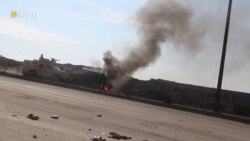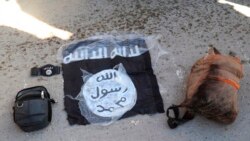Time may finally be running out for followers of Islamic State hoping to break free from a massive make-shift prison in northeastern Syria, where they and thousands of others have been held following the collapse of the terror group’s self-declared caliphate.
A U.S. official, speaking to VOA on the condition of anonymity in order to discuss an ongoing operation, said troops with the U.S.-backed Syrian Democratic Forces on Tuesday “successfully cordoned off” the al-Sina’a prison complex.
The official said the SDF had established both an inner cordon and an outer cordon, making it difficult for IS prisoners or IS sleeper cell operatives to get in or out.
“There is still a significant number of ISIS folks holed up,” the official added, using another acronym for the terror group, noting that most of the holdouts appeared to be concentrated in one building.
Earlier Tuesday, the United States said its forces were continuing to assist the SDF as fighting in and around the prison raged for a sixth day.
"We are still providing a measure of support to the SDF to help to contain this threat," Pentagon press secretary John Kirby told reporters.
"We helped them establish a perimeter around this facility,” he added. “They've seized back several areas that were under ISIS control.”
Earlier Tuesday, the SDF said an operation to retake part of the facility, including a block of eight buildings, allowed them to free nine prison workers held by IS followers.
SDF officials also said another 17 IS members were killed in a series of security sweeps in neighborhoods adjacent to the prison, noting that at least seven were killed after detonating explosive devices.
The assault on the al-Sina’a prison in Hasakah began Thursday night when, according to the SDF, about 200 IS operatives set off a car bomb and converged on the facility.
Al-Sina’a holds about 4,000 IS prisoners including about 700-850 boys and teenagers from IS families.
An SDF official statement indicates about 660 prisoners have surrendered or been recaptured, including 550 in just the past two days.
Officials have said close to 200 IS fighters and prisoners have been killed, while close to 30 SDF soldiers have also died.
Several civilians were also killed in the early stages of the assault on the facility. An SDF spokesperson said at least one person was beheaded by IS fighters trying to gain access to a residence outside of the prison complex.
Both SDF and U.S. officials cautioned that the numbers could change drastically once there is an end to the fighting, which at times has been intense and involved coalition airstrikes and support from both Apache attack helicopters and Bradley Fighting Vehicles.
Officials and humanitarian groups have also raised concerns about the fate of the hundreds of minors who had been held at the facility, with SDF spokespeople saying IS attackers and prisoners had been using them as human shields.
“We have not been able to confirm these allegations,” said United Nations human rights spokeswoman Ravina Shamdasani, calling the reports disturbing.
“We have previously warned about the squalid and insecure state of detention facilities run by the SDF,” Shamdasani added. “It is a recipe for violence, and it is a recipe for some kind of interruption.”
There are also questions about how many IS prisoners may have escaped.
U.N. officials put the number at dozens while the U.S. official said the figure was likely in the 10-20 range. A source close to SDF leadership said the number of escapees might be much higher, although it will be impossible to know for sure until the fighting is over.
SDF officials have also been on alert for additional IS attacks, with a smattering of operations reported across Syria’s northeast.
On Monday, a Western counterterrorism official, speaking with VOA on the condition of anonymity in order to discuss sensitive information, warned more IS operations are likely.
“Definitely, we anticipate further attacks on prisons and camps,” the official said. “This has been a major theme of all recent ISIS leadership communications.”
Analysts, too, fear more IS operations like the assault on al-Sina’a are in the works.
“Clearly their focus right now is on trying to increase their manpower,” said Daveed Gartenstein-Ross, a counterterrorism analyst and the CEO of threat analysis firm Valens Global. “It's clear that they're nowhere near the size that they had when they were able to capture and hold territory for a sustained period in 2014 to 2015.”
Mutlu Civiroglu, Margaret Besheer at the UN, Lisa Schlein in Geneva contributed to this report.







